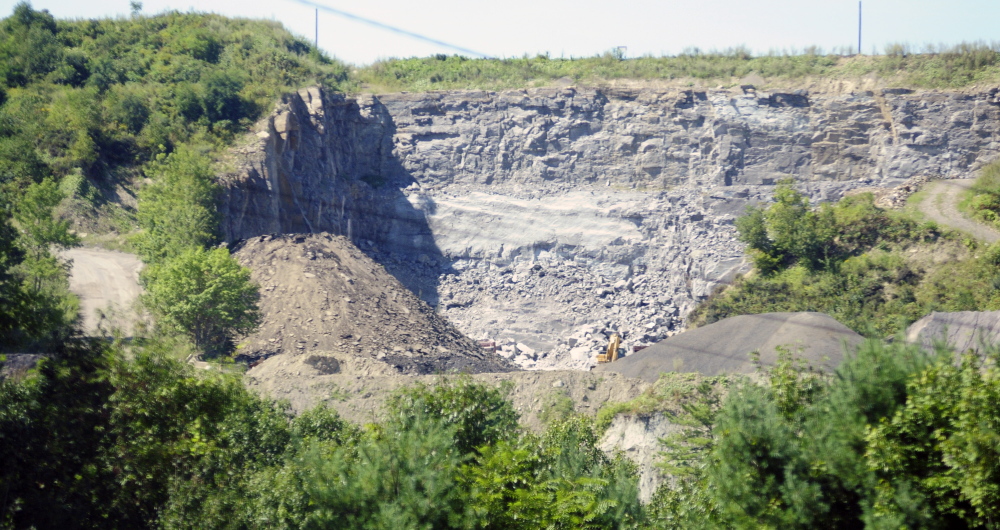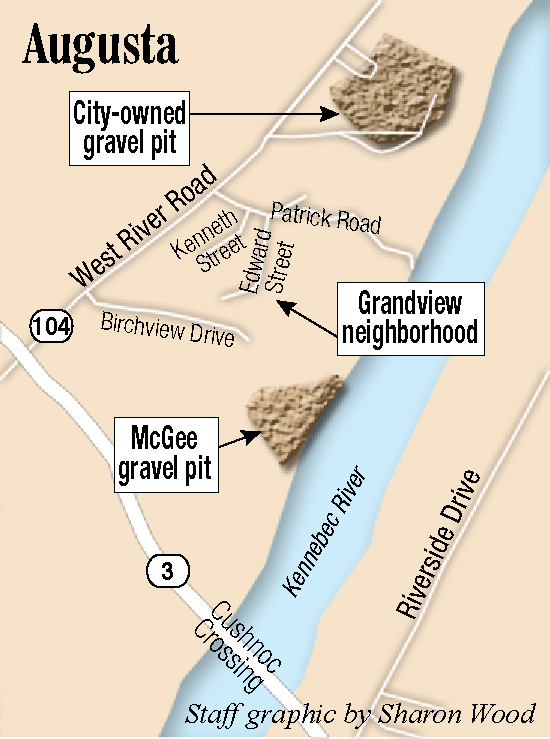AUGUSTA — A blasting company representative said the blasts neighbors to a West River Road pit have complained about are safe for buildings, even if some people perceive them as damaging, and also said even if the company reduced its blasts to new, drastically lower, standards proposed by the city, people still could perceive them incorrectly as dangerous.
Ken Smith, technical supervisor for Gardiner-based Maine Drilling and Blasting, who said he has spent about 40 years in the industry and is “a third-generation blaster,” also said cracks in building materials such as drywall or plaster that could be attributed incorrectly by homeowners to blasting often are caused by temperature changes that occur seasonally and even during a single day as the temperature rises and falls, and by wind and other environmental factors.
He said blasts at higher frequencies are more likely to be felt by humans and thus to be perceived as potentially damaging, but blasts of lower frequencies actually are more likely to cause damage to buildings. So, he said, blasters generally seek to strike a balance with their blasts, to be at a high enough frequency to limit damage but not so high that people would be less likely to perceive them as damaging.
“The chief concern of homeowners is that their home could be damaged, and any vibration producing rumbling or a rattle can feed that fear,” Smith said. “And when fears aren’t allayed, complaints would then be expected from some persons whenever the impact exceeds perceptibility. What we’re saying is even if we lower that to (the city’s proposed new standards), there is still potential for complaint. That’s why education is probably the most important thing a blasting operation can do.”
Smith gave a lengthy presentation Thursday to the Augusta City Council on blasting as the city considers a proposal to reduce the allowable standards for blasting to free up rock in quarries to just 15 percent of current city standards.
Officials of Gardiner-based McGee Construction, owner of the West River Road pit where Maine Drilling and Blasting has conducted blasts to free up rock for use in construction, as well as Augusta-based Quirion Construction, which also has quarrying operations in the city, have said if the current standards in the ordinance decrease as much as proposed, it would force them to close their quarrying operations in Augusta. Then they, and their customers, would have to look elsewhere for stone materials used widely in the construction industry in road and infrastructure projects. They noted the current ordinance was the result of intensive, years-long discussions among industry representatives, city officials and neighbors to quarry operations.
The proposed ordinance change, sponsored by multiple councilors, would reduce the standards for allowable blasts in quarries to only 15 percent of the current city standards, as measured by ground vibrations. Those city standards are already more rigid than state standards for such blasting.
Councilors could vote on the proposal as soon as their next business meeting.
At-large Councilor Jeffrey Bilodeau said some neighborhood residents probably would wonder question what gives a business the right to shake their homes at all.
The proposal was made in response both to ongoing complaints from residents of the Grandview neighborhood and to a city official describing a blast he observed from inside a home as startling and alarming. The Grandview neighborhood is next to a McGee Construction-owned pit and quarry operation that blasts rock up to 10 times a year off West River Road. Matt Nazar, the city’s development director, has attended roughly 40 blasts at quarry operations, mostly in the McGee pit, over the last 10 years. During a recent blast, Nazar was in the home of Grandview resident Roland Maheux, and he said the blast was “startling,” and felt much more significant than blasts of similar size he observed outside.
Smith said that blast was not damaging to buildings despite what Nazar felt. He said it is a natural human reaction to be surprised by blasts. He said if he was in the basement with Nazar that day, he likely would have told himself, leading up to the blast, “Don’t jump, don’t jump. But you know what would happen? I’d still jump (in response to the blast) We’re human beings.”
Nazar said that blast and the other blasts he’s observed at the West River Road pit this year were well below allowable standards for ground vibration contained in the city’s blasting ordinance. He said data indicated the blast was only 20 percent to 25 percent of the maximum allowable blast. So if the city wants to address neighbors’ concerns by reducing the blasts’ impact, the city’s allowable standards would have to be lowered dramatically.
Disputes between the pit owner and neighbors about the effect of blasting there go back many years, and the city’s current mining and blasting rules were formed after a lengthy process involving multiple interested parties.
Keith Edwards — 621-5647
Twitter: @kedwardskj
Send questions/comments to the editors.





Success. Please wait for the page to reload. If the page does not reload within 5 seconds, please refresh the page.
Enter your email and password to access comments.
Hi, to comment on stories you must . This profile is in addition to your subscription and website login.
Already have a commenting profile? .
Invalid username/password.
Please check your email to confirm and complete your registration.
Only subscribers are eligible to post comments. Please subscribe or login first for digital access. Here’s why.
Use the form below to reset your password. When you've submitted your account email, we will send an email with a reset code.